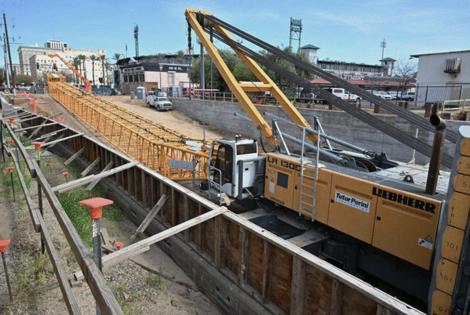Trump says US government 'not going to pay' for California high-speed rail
Published in Political News
SACRAMENTO, Calif. — President Donald Trump says the U.S. government will not pay for California’s high-speed rail project, fueling growing concerns that the bullet train will not have stable federal funding for the foreseeable future.
“That train is the worst cost overrun I’ve ever seen,” Trump said during a Tuesday news conference in the Oval Office. “It’s, like, totally out of control.”
“This government is not going to pay,” Trump added. “We’re not going to pay for that thing.”
Trump’s attacks come just weeks after California High-Speed Rail Authority CEO Ian Choudri said during a Fresno visit that “my hope is that the federal partnership continues.” But they also do not come as a surprise to the authority, whose board last week expressed caution in making financial commitments because of the federal funding uncertainty under Trump’s second term.
“Obviously, we are in trouble,” Martha Escutia, an authority board member from Los Angeles, said during the May 1 meeting.
The president directed the U.S. Department of Transportation in February to launch an audit to determine whether he should rescind roughly $4 billion in unspent allocated funds for the project. The audit is not yet complete.
But if the president does rescind federal money for California high-speed rail, it would not be the first time. Trump canceled $1 billion for the project in 2021 — which the Biden administration restored — and has long criticized its costs and lack of focus on connections to California’s largest metro areas.
State funds have covered most of the bullet train project’s costs, so far, though officials have said support from the federal government is important to keeping the project on track.
The project initially envisioned a system connecting Los Angeles to San Francisco via bullet trains by 2020 at a cost of up to $33 billion. But 17 years after California voters first approved a bond to help fund its construction, the project’s main focus is now a Merced to Bakersfield railway to be operational between 2030 and 2033.
It’s not clear when the railway could connect riders to Los Angeles and San Francisco. But current cost projections indicate completing the original vision could cost up to $128 billion. On Tuesday, Trump claimed it would cost “hundreds of billions of dollars” while also repeating his past claim that “it would have been a lot less costly if we just gave limousine service back and forth and gave it free.”
A rail authority spokesperson rejected the idea that no progress has being made. The spokesperson said the project has created 15,000 jobs with active construction on 119 miles in the Central Valley. The authority has also received full environmental clearance for the Los Angeles to San Francisco route, the spokesperson said.
“Despite the noise in Washington, California’s high-speed rail project is delivering real results,” the spokesperson said.
U.S. Rep Jim Costa, D-Fresno, also defended the project Tuesday.
“There you go again, Mr. President,” Costa said in a statement. “Your misleading comments and outrageous distortions of California’s High-Speed Rail project were evident today.
“This project means jobs, cleaner air, and faster commutes for millions of Californians,” Costa added. “We should be investing in the future, not derailing progress.”
Trump attacks not unexpected
Last week, the authority’s board approved a $14 million contract for the second design phase of the four high-speed rail stations planned for the Central Valley, which will focus on the design of the Fresno station. The board also approved the solicitation of bids for “early works” on the Fresno station, a $58 million project that includes the restoration of Fresno’s historic Southern Pacific train depot downtown.
Before each vote, board member James Ghielmetti raised concerns about the authority entering into contracts while its under threat of losing federal dollars. About 80% of the money to pay for the second design phase of the Central Valley stations is slated to come from federal funding.
Authority officials anticipate federal funds to cover about 60% of the cost for the “early works” on the project’s Fresno station.
“I’m very concerned about receiving the federal funding,” Ghielmetti said. “Just want to make sure that my board members are aware that it (funding) is going to come from somewhere.”
Rail authority staff told the board that the agency has enough contingency money to pay for these projects without federal dollars.
But staff said problems would come into play if the authority were looking at billion-dollar contracts.
_____
©2025 The Sacramento Bee. Visit sacbee.com. Distributed by Tribune Content Agency, LLC.




























































Comments